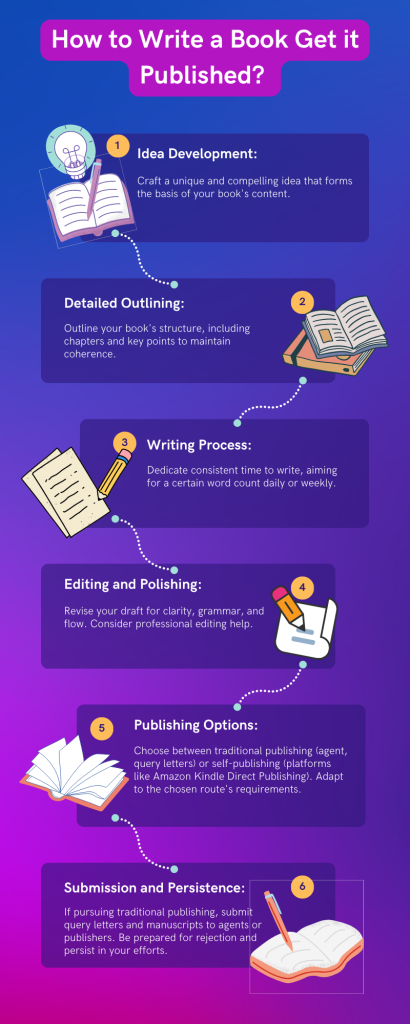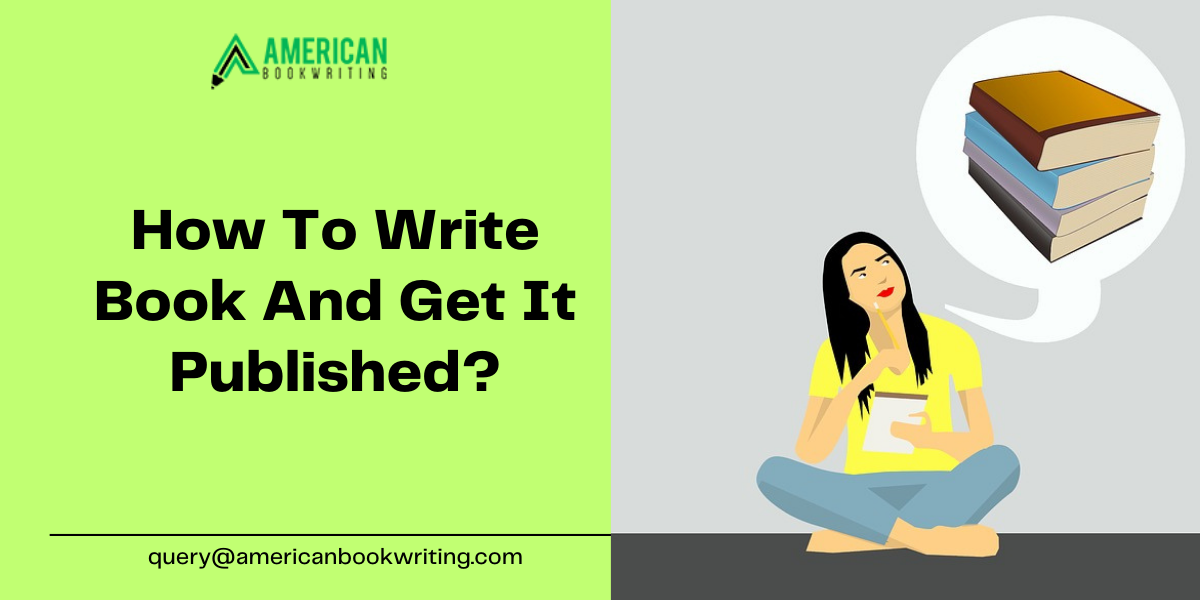Publishing Writing
Press The Play Button On The Audio To Listen Complete Article!
Writing and publishing a book can seem daunting, but it is a fulfilling and rewarding experience for many authors. Whether you have a story to tell or an idea you want to share with the world, the process of writing and publishing a book can be both creative and professional. However, it requires a combination of dedication, hard work, and strategy. In this article, we will explore the steps involved in writing a book and getting it published. From the initial idea to finding a publisher, we will provide tips and guidance for aspiring authors to bring their books to life. Whether you are a first-time author or a seasoned writer, this article will provide valuable insights into book publishing.
How to Write a Book Like a Professional?
Book writing can be a daunting task, even for experienced writers. The process requires careful planning, strong writing skills, and a willingness to revise and edit. This article will explore writing a book like a professional, sharing tips and advice on crafting a compelling story, developing characters and plots, using descriptive language, and editing and revising. Whether you are a first-time author or an experienced writer, this will provide valuable insights and practical guidance for turning your ideas into a polished manuscript:
1- Start with a Plan
Start With A Plan, which is critical in the writing process. For further guidance on planning and organizing your work, consider checking out how to outline your novel: ten simple steps guide for Effective Strategies. Having a plan is crucial for successful book writing. Before starting to write, create a detailed outline of the book’s structure, including chapters, scenes, and key events. Set goals for each writing session and create a realistic schedule for your lifestyle. Use tools like spreadsheets, calendars, and writing software to stay organized and on track. Break your writing into manageable chunks to avoid becoming overwhelmed, and take breaks when needed to avoid burnout. Avoid procrastination by setting clear deadlines and holding yourself accountable. But always remember writing a book is a marathon and that a well-planned approach can help you stay motivated and focused.
2- Write a Compelling Opening
A strong opening is essential for setting the tone for the rest of the book, moreover grabbing the reader’s attention. It should introduce the main theme or conflict and create intrigue that compels the reader to keep turning pages. Start with action, dialogue, or an intriguing description that hooks the reader from the first sentence. Use sensory details to create vivid imagery and engage the reader’s senses.
3- Develop Characters and Plot
Well-developed characters and plot are the heart of any great book. Characters should be interesting, relatable, and have clear goals and motivations. Show their strengths and weaknesses, and create well-rounded personalities. The plot should be engaging, with a clear beginning, middle, and end that keeps the reader interested. Use conflict, tension, and suspense to build excitement and keep readers turning pages. Effective examples of character and plot development can be found in works such as J.K. Rowling’s “Harry Potter” series, with its complex characters and richly detailed plot, and F. Scott Fitzgerald’s “The Great Gatsby,” which explores themes of love, ambition, and the corrupting influence of wealth.
4- Use Vivid Language
Descriptive language is essential to engage readers and bring the story to life. Use sensory details to create vivid imagery and evoke the reader’s emotions. Use metaphors, similes, and personification to add depth and meaning to the story. As exemplified in classic literature. For more on impactful writing, explore 15 best books on stoicism for beginners, which can provide insights into powerful narrative techniques. Effective use of language can be seen in books such as Toni Morrison’s “Beloved,” which uses lyrical prose and vivid imagery to explore themes of memory, trauma, and redemption.
5- Edit and Revise
Editing and revising are vital steps in the writing process that can improve a manuscript’s clarity, coherence, and quality. Take breaks between drafts and read the manuscript out loud to catch errors and improve flow. Seek feedback from beta readers or any best ghostwriting agency to identify weaknesses and suggest improvements. Effective editing and revision can turn a good manuscript into a great one.
Complete and Easy Steps for Getting Your Book Published
Publishing a book can be challenging, but it is well worth the effort. Whether you choose traditional publishing or self-publishing, there are easy steps to make the process smoother and more successful. We will provide you with complete and easy steps for publishing your book.
Step 1: Writing Your Book
Before you can publish a book, you need to write it. Explore how to write a book summary that sells books for strategies on crafting compelling summaries to attract publishers and readers. Start with idea generation, and then move on to outlining your book. Set aside time each day or week to write, and stick to that schedule. When you have a first draft, it’s time to edit and revise.
Step 2: Finding an Agent
Finding an agent is an important step if you are pursuing traditional publishing. An agent can help you navigate the publishing industry, connect you with publishers, and negotiate contracts on your behalf. The first step in finding an agent is researching potential agents representing your genre. Look at their track record, client list, and submission guidelines. When you have a list of agents you are interested in, it’s time to query them. Your query letter should be personalized, professional, and concise. If an agent is interested, they may request a partial or full manuscript. From there, they may offer representation and begin the contract negotiation process.
Step 3: Submitting to Publishers
Once you have an agent, or if you choose to submit your manuscript without one, it’s time to research publishers. Look for publishers who specialize in your genre and have published similar books in the past. When you have a list of potential publishers, read their submission guidelines carefully. Follow these guidelines to the letter, as failing to do so can result in your manuscript being rejected without consideration. If a publisher is interested, they may request revisions or offer a contract. Be prepared to negotiate terms, and ensure you understand all the agreement details before signing.
Step 4: Self-Publishing
This has become a popular option for authors who wish for more control over their publishing process. There are pros and cons to self-publishing, so it’s important to weigh these carefully before making a decision. If you choose to self-publish, the first step is to choose a platform or service to help you. Look for one that offers the tools you need, such as formatting and distribution, and has a good industry reputation. Once your book is published, you must market it aggressively to reach potential readers. You can also check any book publishing services to publish your book.
Step 5: Marketing Your Book
No matter how you publish your book, marketing is key to its success. Start by creating a professional author website, and use social media to connect with readers and promote your work. Consider offering giveaways or discounts to entice readers to try your book. Reach out to bloggers, book clubs, and reviewers to get your fantastic book in front of more readers. Consider attending book festivals or conventions to meet readers and other authors. You can also contact book marketing services for the promotion and marketing of your book

Reasons you might fail to get a book published
The publishing industry is highly competitive, and many factors can prevent a book from being published. We will discuss the reasons below why you might fail to get your book published:
1- Lack of Research
One of the biggest reasons for failing to publish a book is a lack of research. Many authors make the mistake of sending their manuscripts to any publisher or agent without doing their homework. It is important to research publishers or agents who specialize in your genre and have a track record of success. It is also important to read submission guidelines carefully and follow them in the letter. Failing to do so can result in your manuscript being rejected without consideration. Additionally, authors who do not understand the publishing industry and its nuances will likely face difficulty getting their books published.
2- Poor Writing
Another reason for failure is poor writing. No matter how great the plot or characters are, publishers and agents will not be interested if the writing is weak. Poor storytelling, bad grammar, and spelling errors can all detract from the quality of the writing. Authors should work to improve their writing skills, seek feedback from beta readers or professional book editors, and revise their manuscripts accordingly.
3- Lack of Persistence
Publishing is not easy, and it takes persistence and patience. Many authors give up too soon after receiving a few rejections or not hearing back from publishers or agents. It is important to submit your manuscript to as many publishers or agents as possible and to be willing to make revisions or edits if requested. It is also important to recall that rejection is not personal and to keep working on your craft and submitting your work.
4- No Platform
In today’s digital age, having a platform is important for authors. A platform can include a website, a social media presence, and a following or audience. Publishers and agents want to work with authors who have an established platform and can help market their books. Authors who have not built a following or established credibility in their genre will likely face difficulty publishing their books.
5- Not Understanding the Market
Another reason for failure is not understanding the market. Authors who write a book that does not fit with the market or does not appeal to a specific audience are unlikely to get published. It is important to write for a specific genre or audience and to keep up with current trends and demands. Researching successful books in your genre and understanding what makes them successful can help you tailor your manuscript accordingly.
Pros of Publishing a Book
Publishing a book is a significant achievement for any author. It is an opportunity to share your ideas with a wide audience and build your brand, establish credibility, and earn a living. We will discuss the pros of publishing a book and why it is a worthwhile endeavor.
1- Sharing Your Ideas
One of the main benefits of publishing a book is the ability to share your ideas with a large audience. Your writing can influence how people think and see the world and possibly make a difference in people’s lives. A book can serve as a platform for spreading important ideas and sparking discussions. It is a chance to contribute to the cultural conversation and impact society.
2- Earning Royalties
Publishing a book can also provide a source of income for authors. While not all authors may earn enough to make a living from their writing, many do earn royalties that can supplement their income. Depending on the publishing contract, an author can earn a percentage of book sales or receive an advance payment. Additionally, with the rise of self-publishing, authors have more opportunities to earn money from their writing. By publishing an ebook or print book, authors can create a passive income stream and potentially earn royalties for years to come.
3- Building Your Brand
Publishing your book can also help build your brand as an author. By establishing yourself as a published author, you can gain recognition and respect in the industry. A book can serve as a portfolio of your writing skills and help attract new readers, agents, and publishers. It can also serve as a launching pad for future writing projects, opening up new opportunities for you as an author.
4- Networking Opportunities
Another benefit of publishing a book is the networking opportunities it provides. Authors can build professional relationships in the industry by working with publishers, editors, and agents. This can lead to collaboration, joint projects, and opportunities for mentorship and support. Additionally, by attending book events and conferences, authors can connect with other authors and industry professionals, opening up new doors for future writing projects.
5- Personal Growth
Publishing a book can also provide opportunities for personal growth and development. Writing a book requires discipline, dedication, and hard work. Authors can learn new skills, expand their knowledge, and build confidence and self-esteem through writing. By publishing a book, authors can push themselves outside of their comfort zones and achieve a significant accomplishment, which can, in turn, inspire them to pursue further personal and professional growth.
Explore the rich tapestry of American thought and culture with our collection of thought-provoking and insightful American essays.
FAQS
How long does it take to write a book?
The time it takes to write a book varies depending on the writer, the genre, and the book’s length. Some authors can write a book in a few months, while others take years. On average, completing a full-length novel can take around six months to a year. However, this timeline can be shorter or longer based on the complexity of the story, the writer’s schedule, and other factors that can affect the writing process. Ultimately, the most important thing is to focus on writing consistently and working towards completing the book at a pace that works for you.
How much does it cost to write a book?
The cost of writing a book can vary widely depending on factors such as the genre, the book’s length, and the writer’s experience. Writing a book can be done on a budget, with little to no cost involved, especially for those who prefer self-publishing. However, for traditionally published authors, costs may include professional editing, cover design, and marketing expenses, which can add up. The most significant investment, however, is time, as writing a book requires significant effort and dedication. Ultimately, the book’s cost will depend on the individual writer’s goals, preferences, and financial resources.
How much money do you need to publish a book?
The cost of publishing a book can vary depending on whether you choose to self-publish or go through a traditional publisher. Self-publishing can be done on a budget, with expenses such as editing, cover design, and formatting costing anywhere from a few hundred to a few thousand dollars. Traditional publishing, on the other hand, typically involves upfront costs, such as hiring a literary agent or submitting manuscripts to publishers. These costs can vary widely from a few hundred to several thousand dollars. Ultimately, the amount of money you need to publish a book will depend on factors such as your publishing goals, the quality of your manuscript, and the resources available.
Does Amazon pay you to publish a book?
Amazon does not pay authors to publish their books but offers royalty payments for books sold through their platform. Authors who self-publish their books through Amazon’s Kindle Direct Publishing (KDP) program can earn royalties of up to 70% of the book’s sale price, depending on the pricing and distribution options selected. Additionally, authors can choose to enroll their books in Kindle Unlimited, a subscription service that pays authors based on the number of pages read by subscribers. Overall, while Amazon does not pay authors upfront for their work, they offer an opportunity for authors to earn money through book sales and royalties.
How should I price my book?
Pricing a book can be a difficult decision for authors, as it can significantly impact sales and royalties. It is vital to consider factors such as the genre, the book’s length, and the pricing of similar books in the market when setting a price. Generally, self-published books tend to be priced lower than traditionally published books. Additionally, offering discounts and promotions can help attract readers and boost sales. Ultimately, finding the right price for your book requires a balance between maximizing profits and making the book accessible to readers. It is important to experiment with pricing strategies and adjust as necessary to find the sweet spot for your book.
How old do you have to be to publish a book?
There is no specific age requirement to publish a book. Anyone, regardless of age, can write and publish a book. However, suppose the author is a minor. In that case, they may need to have a parent or guardian involved in the publishing process, as legal contracts and financial transactions may require an adult’s involvement. Additionally, some publishers and literary agents may be more willing to work with established authors or those over a certain age, but there is no hard and fast rule. Ultimately, as long as the book is well-written and meets publishing standards, age should not be a barrier to publication.
How long does it take to publish a book?
The time it takes to publish a book can vary widely depending on several factors. If an author goes the traditional publishing route, it can easily take several months or even years to find an agent and get a publishing contract. Once a publisher accepts a manuscript, the editing, design, and production process can take several months to a year or more. Alternatively, authors who choose to self-publish their books can typically complete the publishing process much more quickly, often in weeks.
How to get your book in Target stores?
Getting your book in Target stores can be a great way to increase exposure and sales. However, getting your book placed on Target shelves is not easy. One option is to work with a distributor specializing in getting books into retail stores. Another approach is to contact the book buyer at your local Target store and ask if they would be interested in carrying your book. It can also be helpful to have a strong online presence and positive customer reviews, as Target buyers may look at these factors when deciding which books to carry in their stores. Ultimately, getting your book in Target stores will require persistence, networking, and a willingness to work with retailers to meet their needs.
How to publish a book as a teenager?
Publishing a book as a teenager can be a great way to showcase your writing talent and start building a career as an author. The first step is to write a high-quality manuscript and have it edited by a professional. From there, teenagers can explore traditional publishing options, such as submitting their manuscripts to literary agents or publishing houses. Alternatively, they can self-publish their book through online platforms like Amazon or CreateSpace. Teenagers may also consider entering writing contests or submitting their work to literary magazines to build their writing credentials and gain exposure.
Can you publish a book anonymously?
A: Yes, it is possible to publish a book anonymously. This can be done by using a pseudonym, a fake name used by the author in place of their real name. Publishing anonymously can be useful for writers who wish to maintain their privacy or write controversial material without facing potential backlash. However, note that using a pseudonym may impact the marketing and promotion of the book, as it can make it more difficult for readers to identify the author and connect with them.
Can you edit a Google Site after publishing?
Yes, you can edit a Google Site after publishing it. Google Sites allows users to edit and update their content at any time. This can be done by logging into your Google account, navigating to the site you want to edit, and clicking the “Edit” button. From there, you can make any necessary changes to the site’s content, layout, or design. Once you have finished making your changes, click the “Publish” button to make your updated site live. It is important to note that any changes you make will be visible to visitors to your site immediately after publishing.
Conclusion:
Remember that writing and publishing a book is a process that requires patience and persistence. Getting your book to its best form may take several drafts and revisions, but the effort is worth it. Don’t be afraid to seek feedback, guidance, and support from fellow ghostwriters, editors, and agents to help you along the way.
Ultimately, the key to success is staying focused on your vision and goals and pushing forward despite setbacks or rejections. Following the steps in this article and staying committed to your craft, you can become a published author and share your message with the world. So, start writing, stay inspired, and let your creativity take flight!
Learn how to write a book and get it published with American Book Writing Services! Our expert team can guide you through the process and help you succeed.




